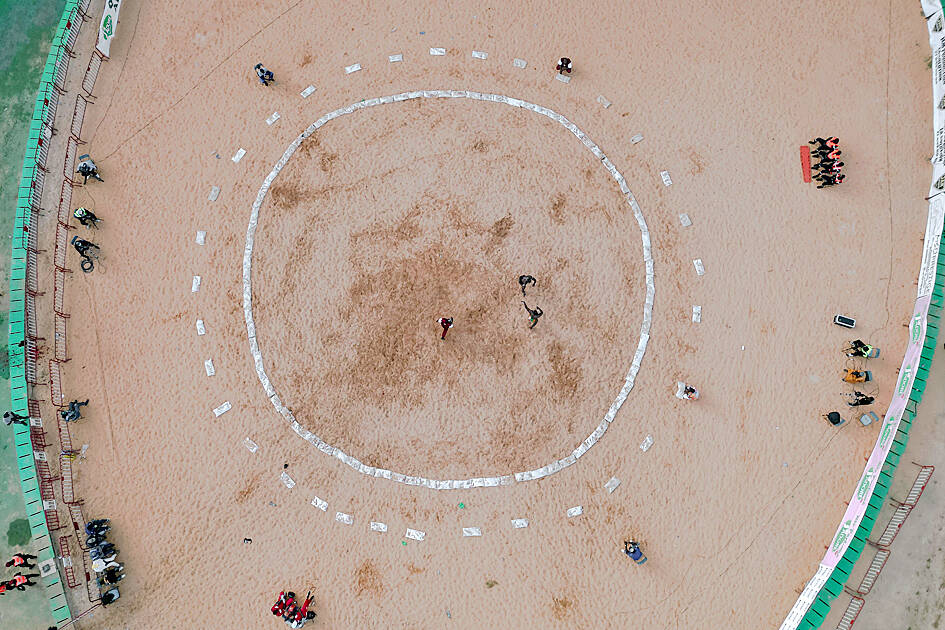Wrestling is enormously popular in Senegal — and the decisions that award victory or crushing defeat to the grapplers are now overseen by the same technology that is dividing opinion in soccer across the world.
At a fight last month at the National Arena in Pikine, just outside the capital, Dakar, 15,000 fans cheered on the bare-chested wrestlers to the beat of drums and encouragements booming out of loudspeakers.
However, Sitor Ndour was not watching the ring — his eyes were firmly fixed on a TV monitor placed in a small blue tent a few meters from the fight. He was the video assistant referee (VAR) judge.

Photo: AFP
Wrestling fans in the west African country have long called for VAR to be introduced into their sport and last year that wish became reality.
Three cameras record the action from different angles, which Ndour can view on two screens.
Although the technology is far from that found at soccer matches in Europe, if a decision is disputed, the VAR official can call over the main umpire and show him the recordings.

Photo: AFP
Senegalese Wrestling Association vice president Maissa Ndiaye said the advent of VAR was a source of relief for the referees in a sport which in Senegal has prize money of several tens of millions of CFA francs, equivalent to tens of thousands of US dollars.
“Sometimes we had a disputed verdict, which caused confusion and [as a result] people broke chairs and destroyed public property because they weren’t happy with the result that had been given,” said Ndour, who is the president of the referees’ committee. “In this kind of situation if we can review the footage and declare a winner, but also if the public can see the images, that makes our task easier and it allows the spectators to go home with more peace of mind.”
In the high-profile fight last month, VAR was called into action several times.
In one of the preliminary bouts, which was broadcast live on TV, two heavily muscled fighters, stripped to the waist, were both looking for ways past their opponents and the crucial edge that would give them victory.
One of the fighters pulled off a move that led both of them to land on the filled sacks that mark out the ring — and both claimed victory.
VAR was called in, with the chief judge making the same screen gesture with his hands that soccer referees use. The judge walked over to the VAR screen and, having seen the recording, returned to the ring and lifted the arm of one of the wrestlers to indicate he was the winner.
His beaten opponent loudly contested the decision and pushed his way toward the VAR tent before he was restrained by security, who eventually escorted him away.
Such scenes were common because while some wrestlers have accepted the introduction of VAR, others have yet to fully grasp how the system works and often demand to the see the video footage themselves, Ndour said.

Manchester City have reached do-or-die territory in the UEFA Champions League earlier than expected ahead of what Pep Guardiola has described as a “final” against Club Brugge today. City have disproved the suggestion a new format to Europe’s top club competition would remove any jeopardy for the top clubs as Guardiola stares down the barrel of failing to make the Champions League knockout stages for the first time in his career. The English champions have endured a torrid season both in their English Premier League title defense and on the continent. A run of one win in 13 games, which included Champions League

BACK-TO-BACK: The League One club, which is owned by stars Ryan Reynolds and Rob McElhenney, is sparing no expense to clinch promotion to the Championship Hollywood endings are pricey, even in England’s third division. In pursuit of their third straight promotion, Wrexham AFC splashed some cash at League One rival Reading to secure the services of striker Sam Smith. The Welsh club owned by actors Ryan Reynolds and Rob McElhenney confirmed the signing of the 26-year-old Smith on Friday. He is one of the top scorers in the third division. The transfer fee was not disclosed, but British media widely reported it to be about £2 million (US$2.48 million) — not extravagant, but a hefty price at this level and it would be about the same figure that

Oklahoma City star Shai Gilgeous-Alexander on Sunday poured in 35 points as the Thunder grabbed a bounce-back 118-108 victory in Portland to push their NBA-best record to 37-8. The Thunder, surprised by the short-handed Dallas Mavericks on Thursday, fended off a late surge from the Trail Blazers to snap their four-game winning streak. Jalen Williams scored 24 points and Isaiah Joe added 16 off the bench. Center Isaiah Hartenstein, back after a five-game absence with a calf injury, added 14 points, 11 rebounds, six assists and a big block. The Western Conference leaders were under pressure late as Portland, trailing by 15 heading

The Golden State Warriors on Wednesday withstood Oklahoma City star Shai Gilgeous-Alexander’s 52-point outburst to beat the Western Conference leading Thunder 116-109. Andrew Wiggins scored 27 points and Warriors superstar Stephen Curry scored 17 of his 21 points in the second half as Golden State erased a double-digit deficit and pulled away late for the victory. “We just stayed solid,” said Curry, who entered the contest mired in a shooting slump and had just four points on one basket in the first half. “Just all-around effort.” The Thunder, fueled by 31 first-half points from Gilgeous-Alexander, led by as many as 14 in the